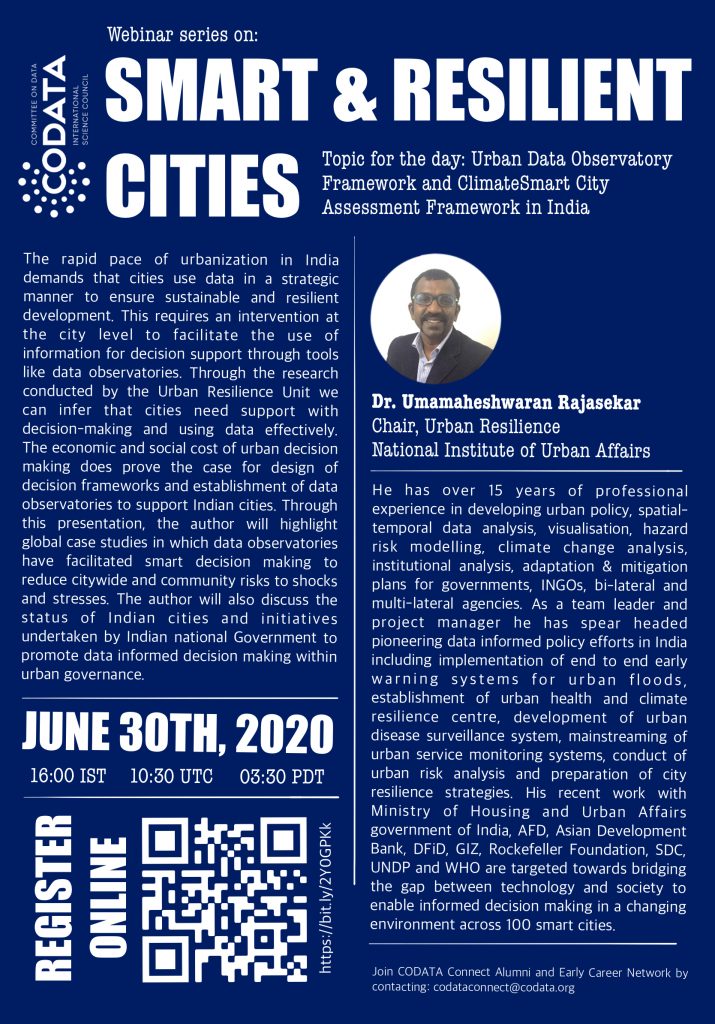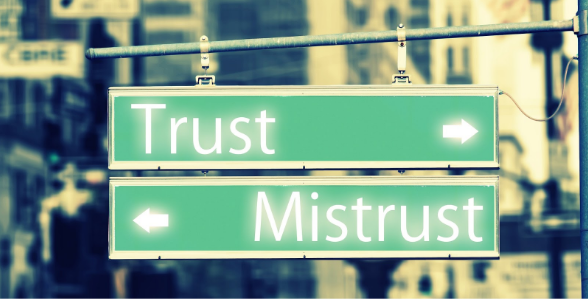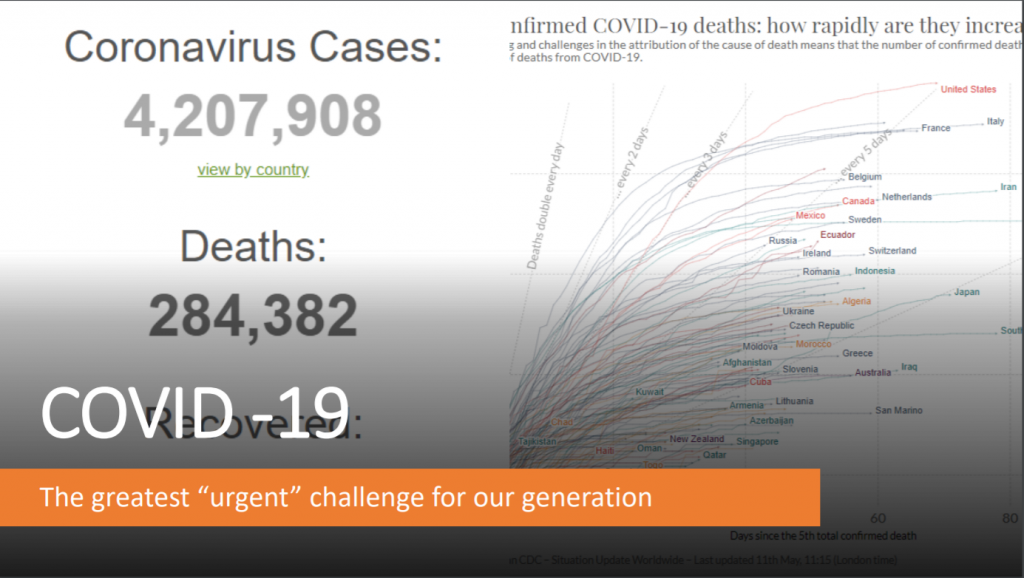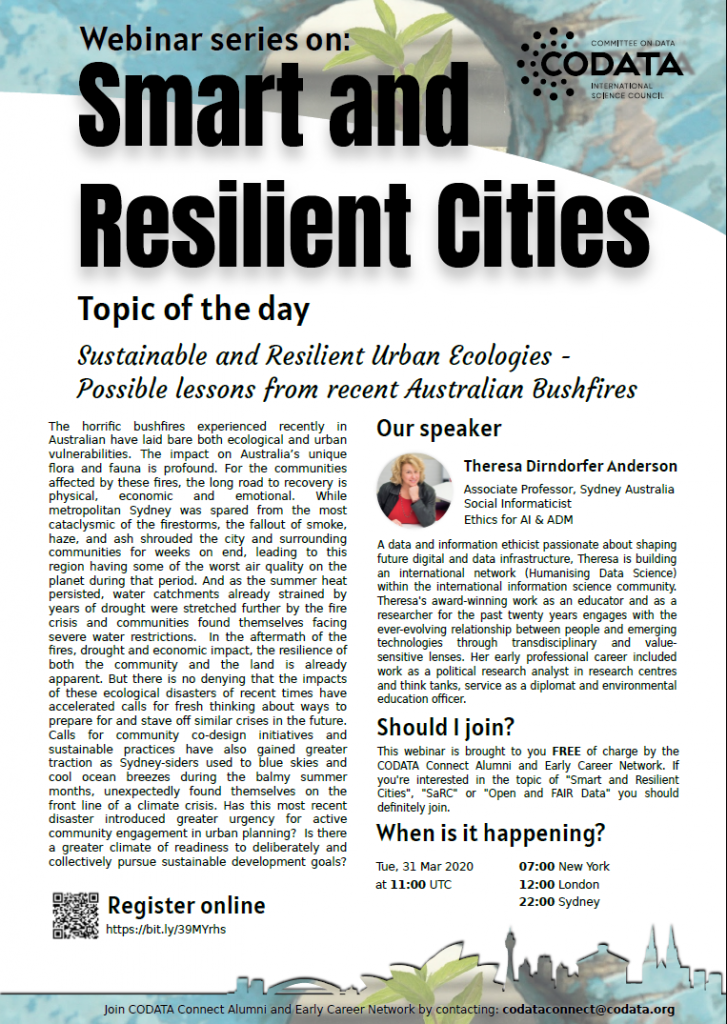On 21 September 2020, a webinar titled “Urban Data Space as New Frontier: A Responsible Research and Innovation Perspective” was organized by the CODATA Connect Alumni and Early Career Network. This was the sixth webinar in the series on Smart and Resilient Cities, while other webinars are planned in the coming months throughout 2020. Dr. Shaily Gandhi of the CODATA Connect introduced the speaker and theme of the webinar series. As introduced, the speaker Dr. Robert Braun is currently a Senior Researcher and the Deputy Head of the Techno-Science & Societal Transformation research group at Institute for Advanced Studies (IHS) in Vienna, and Associate Professor at Masaryk University in Brno. He studied philosophy of arts and history at the University of Budapest and completed a Ph.D. in philosophy. He taught at numerous universities in the EU and the US. His research projects involve the representation and engagement of stakeholders in corporate communities as well as the societal impacts of autonomous mobility.
Robert began his talk by introducing DataSpace and its short history. DataSpace is one of the new frontiers of innovation in digital technology. In recent conceptualizations of industrial DataSpace technology, different scholars envisioned DataSpace as an open business ecosystem for securing exchange and easy linkage of data, as Fraunhofer (2018) observed. Smart City projects worldwide intend to manage big data in urban environments and face the challenges of organizational complexities. European cities and communities require a set of tools to achieve a sustainable transformation towards smarter cities and municipalities and a structured approach to leverage the emerging data-driven economy’s potential, as perceived by Cuno et al. (2019). Then Robert introduced the Urban DataSpace (UDS), which facilitates an ecosystem for data exchange and added value creation utilizing various data types within a smart city or municipality. UDS may, thus, be seen as a new type of urban infrastructure. He pointed out while the relational database management systems served to focus the data management community for decades, rapidly expanding demands of ‘data everywhere’ have led to a new field in data science to emerge. UDS is one such emerging field.
He describes the actor-network theory (ANT) vis-à-vis the responsible research and innovation (RRI). In the ANT framework, technology serves as a distributed agency in actor-actant networks, networks serve as performed material-semiotic spaces, and there are multiple realities. On the other hand, the RRI framework assesses the social desirability, anticipation, reflexivity, responsiveness, and inclusivity of technology and innovation.
He described the semiotics of DataSpace, i.e., mapping the problems in an artificial intelligence (AI)-based, or a data-driven environment. DataSpace serves as a ‘sign relational complex’ to support data science pragmatics, such as ascertaining, assessing, and researching the processes and intentions of data collecting agents or data analytics elements. There are concerns related to AI learning issues, particularly debiasing, black-boxing, semiotic complexities, and the multistability and multidimensionality of data. He briefly narrated the characteristics of trustworthy DataSpace and responsible DataSpace, respectively, based on the trustworthy AI principles and the RRI principles.
He opined that COVID-19 poses dangers of onlinefication of everything and (big)data-driven research and innovation. He further opined that the EU promotes responsible research and innovation (RRI) in principle, but the implementation leaves much to be desired. Robert Braun concludes that there is a need to improve the alignment of research policy and societal values in urban DataSpace and data-driven society.
Mr. Felix Emeka Anyiam of the CODATA Connect moderated the Question and Answer session and was assigned to obtain questions from the online participants keyed into the webinar question handle. Some of the questions were related to data sovereignty, how data localization can help in responsible and ethical DataSpace, and how GDPR takes care of responsible DataSpace. The speaker briefly appraised the audience on recent EU and international frameworks on the subject.
The session was concluded with a vote of thanks presented by Shaily. She also announced the forthcoming activities of the CODATA Connect for the CODATA alumni and early career data science professionals.
Prepared by:
Anup Kumar Das
(Jawaharlal Nehru University, India, anup_csp@jnu.ac.in)

 On 30 June 2020, a webinar titled “
On 30 June 2020, a webinar titled “ On 25th May 2020, a webinar titled “
On 25th May 2020, a webinar titled “
 On 31st March 2020, a webinar titled “Sustainable and Resilient Urban Ecologies: Possible Lessons from Recent Australian Bushfires” was organized by the CODATA Connect Alumni and Early Career Network. Dr. Shaily Gandhi of the CODATA Connect introduced the speaker and theme of the webinar series. This was the first Webinar in the series on Smart and Resilient Cities, while other webinars are planned in the coming months throughout 2020. As introduced, the speaker Ms. Theresa Dirndorfer Anderson is a data and information ethicist passionate about shaping future digital and data infrastructures. Based in Sydney, Australia, she is an active contributor to local and international initiatives to humanize data science. Theresa’s award-winning work as an educator and as a researcher for the past twenty years engages with the ever-evolving relationship between people and emerging technologies through transdisciplinary and value-sensitive lenses. Her scholarly work involves the fundamental concepts of uncertainty, relevance and resilience. Before her academic career, Theresa worked as an analyst in research centres and think tanks. She has also worked as a diplomat and environmental education officer.
On 31st March 2020, a webinar titled “Sustainable and Resilient Urban Ecologies: Possible Lessons from Recent Australian Bushfires” was organized by the CODATA Connect Alumni and Early Career Network. Dr. Shaily Gandhi of the CODATA Connect introduced the speaker and theme of the webinar series. This was the first Webinar in the series on Smart and Resilient Cities, while other webinars are planned in the coming months throughout 2020. As introduced, the speaker Ms. Theresa Dirndorfer Anderson is a data and information ethicist passionate about shaping future digital and data infrastructures. Based in Sydney, Australia, she is an active contributor to local and international initiatives to humanize data science. Theresa’s award-winning work as an educator and as a researcher for the past twenty years engages with the ever-evolving relationship between people and emerging technologies through transdisciplinary and value-sensitive lenses. Her scholarly work involves the fundamental concepts of uncertainty, relevance and resilience. Before her academic career, Theresa worked as an analyst in research centres and think tanks. She has also worked as a diplomat and environmental education officer.